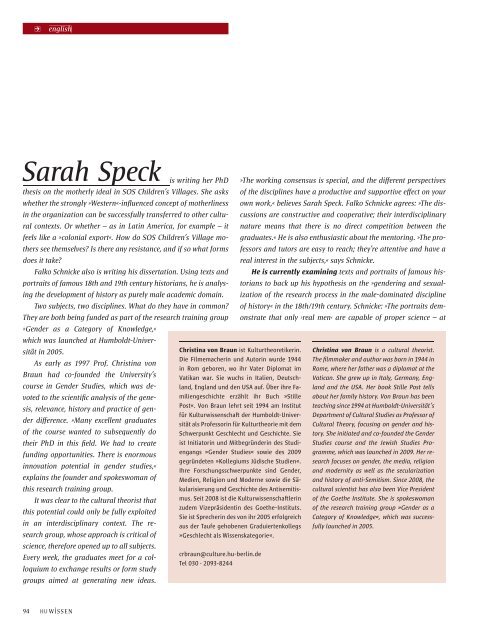hu wissen (pdf) - Exzellenzinitiative - Humboldt-Universität zu Berlin
hu wissen (pdf) - Exzellenzinitiative - Humboldt-Universität zu Berlin
hu wissen (pdf) - Exzellenzinitiative - Humboldt-Universität zu Berlin
Sie wollen auch ein ePaper? Erhöhen Sie die Reichweite Ihrer Titel.
YUMPU macht aus Druck-PDFs automatisch weboptimierte ePaper, die Google liebt.
Sarah Speck is writing her PhD<br />
thesis on the motherly ideal in SOS Children’s Villages. She asks<br />
94<br />
k english<br />
whether the strongly »Western«-infl uenced concept of motherliness<br />
»The working consensus is special, and the diff erent perspectives<br />
of the disciplines have a productive and supportive eff ect on your<br />
own work,« believes Sarah Speck. Falko Schnicke agrees: »The dis-<br />
in the organization can be successfully transferred to other cultucussions are constructive and cooperative; their interdisciplinary<br />
ral contexts. Or whether – as in Latin America, for example – it nature means that there is no direct competition between the<br />
feels like a »colonial export«. How do SOS Children’s Village mo- graduates.« He is also ent<strong>hu</strong>siastic about the mentoring. »The prothers<br />
see themselves? Is there any resistance, and if so what forms fessors and tutors are easy to reach; they’re attentive and have a<br />
does it take?<br />
real interest in the subjects,« says Schnicke.<br />
Falko Schnicke also is writing his dissertation. Using texts and He is currently examining texts and portraits of famous his-<br />
portraits of famous 18th and 19th century historians, he is analystorians to back up his hypothesis on the »gendering and sexualing<br />
the development of history as purely male academic domain. ization of the research process in the male-dominated discipline<br />
Two subjects, two disciplines. What do they have in common? of history« in the 18th/19th century. Schnicke: »The portraits dem-<br />
They are both being funded as part of the research training group<br />
»Gender as a Category of Knowledge,«<br />
which was launched at <strong>Humboldt</strong>-Univeronstrate<br />
that only ›real men‹ are capable of proper science – at<br />
sität in 2005.<br />
Christina von Braun ist Kulturtheoretikerin. Christina von Braun is a cultural theorist.<br />
As early as 1997 Prof. Christina von<br />
Braun had co-founded the University’s<br />
Die Filmemacherin und Autorin wurde 1944<br />
in Rom geboren, wo ihr Vater Diplomat im<br />
Vatikan war. Sie wuchs in Italien, Deutsch-<br />
The fi lmmaker and author was born in 1944 in<br />
Rome, where her father was a diplomat at the<br />
Vatican. She grew up in Italy, Germany, Eng-<br />
course in Gender Studies, which was deland, England und den USA auf. Über ihre Faland and the USA. Her book Stille Post tells<br />
voted to the scientifi c analysis of the genemiliengeschichte erzählt ihr Buch »Stille about her family history. Von Braun has been<br />
sis, relevance, history and practice of gender<br />
diff erence. »Many excellent graduates<br />
Post«. Von Braun lehrt seit 1994 am Institut<br />
für Kultur<strong>wissen</strong>scha� der <strong>Humboldt</strong>-<strong>Universität</strong><br />
als Professorin für Kulturtheorie mit dem<br />
teaching since 1994 at <strong>Humboldt</strong>-<strong>Universität</strong>’s<br />
Department of Cultural Studies as Professor of<br />
Cultural Theory, focusing on gender and his-<br />
of the course wanted to subsequently do Schwerpunkt Geschlecht und Geschichte. Sie tory. She initiated and co-founded the Gender<br />
their PhD in this fi eld. We had to create ist Initiatorin und Mitbegründerin des Studi- Studies course and the Jewish Studies Pro-<br />
funding opportunities. There is enormous engangs »Gender Studies« sowie des 2009 gramme, which was launched in 2009. Her re-<br />
innovation potential in gender studies,«<br />
explains the founder and spokeswoman of<br />
gegründeten »Kollegiums Jüdische Studien«.<br />
Ihre Forsc<strong>hu</strong>ngsschwerpunkte sind Gender,<br />
Medien, Religion und Moderne sowie die Säsearch<br />
focuses on gender, the media, religion<br />
and modernity as well as the secularization<br />
and history of anti-Semitism. Since 2008, the<br />
this research training group.<br />
kularisierung und Geschichte des Antisemitis- cultural scientist has also been Vice President<br />
It was clear to the cultural theorist that mus. Seit 2008 ist die Kultur<strong>wissen</strong>scha� lerin of the Goethe Institute. She is spokeswoman<br />
this potential could only be fully exploited<br />
in an interdisciplinary context. The re-<br />
<strong>zu</strong>dem Vizepräsidentin des Goethe-Instituts.<br />
Sie ist Sprecherin des von ihr 2005 erfolgreich<br />
aus der Taufe gehobenen Graduiertenkollegs<br />
of the research training group »Gender as a<br />
Category of Knowledge«, which was successfully<br />
launched in 2005.<br />
search group, whose approach is critical of<br />
science, therefore opened up to all subjects.<br />
»Geschlecht als Wissenskategorie«.<br />
Every week, the graduates meet for a colloquium<br />
to exchange results or form study<br />
groups aimed at generating new ideas.<br />
crbraun@culture.<strong>hu</strong>-berlin.de<br />
Tel 030 · 2093-8244



